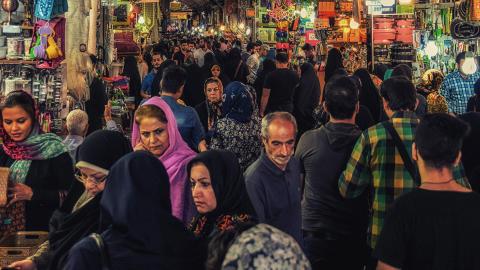
ANALYSIS: Change Is Coming to Iran, and It's Coming Fast
The hijab — the headscarf traditionally worn by many Middle East women — is becoming harder to spot in Iran these days.
For many Iranian women, the hijab has become a symbol of oppression. They're refusing to wear it, even under the threat of beatings and imprisonment.
Change is coming to the autocratic, saber-rattling Islamic Republic of Iran that Americans see on the news. And it's coming fast.
It's clearly visible on the streets of the capital Tehran in the wake of the mass protests that began in September 2022, following the death in police custody of Mahsa Amini, a 22-year-old woman who resisted wearing her hijab.
The raw emotion of the protests — including images of women publicly burning their hijabs — has evolved into a controlled expression of resoluteness and strength.
Explosive Yearning
The protests, known as the "Women, Life, Freedom Movement", burst the cork out of the bottle. The demonstrations, resulting in thousands of arrests and more than 500 deaths over several months, were an explosion of yearning for women's rights.
And the Iranian regime got the message loud and clear.
The protests cleared the fog and smoke between the demands of the people and the demands of the state. A clear line has been drawn. Both know what each other's demands are. The government has resumed its "morality police" project to force women to wear the hijab. But Iranian women are not backing off.
This movement continues to gather momentum.
Increasingly, Iranian men are showing broad support for women's rights and freedoms. They're recognizing core human rights that benefit the whole of society. This would have been unimaginable just a few years ago.
The change is not only social. It's religious, too.
Christians in Iran have long been subjected to persecution and even torture and death. Today, Iran has the third highest number of religious prisoners, with 347 citizens behind bars for their faith — and those are just ones we know about.
But most Iranians don't see Christians as "the enemy" anymore.
A generation ago, the idea of being an Iranian and a Christian was unthinkable, unforgivable even. Now it's accepted without a blink.
Yet the hardline regime still denies citizens the freedom to attend church or convert to Christianity. Officially, there isn't a single Farsi-speaking church in the entire nation of 90 million people.
Illegal house churches — believers secretly meeting in homes — are raided routinely by the police, their leaders interrogated and imprisoned.
A New Revolution
But new media platforms, including Zoom, Instagram, and WhatsApp, are revolutionizing church for Iran's "isolated" believers.
They're worshiping online in real-time with other isolated believers outside Iran in places such as Türkiye, building a sense of Christian unity in a region that's 97% non-Christian. Respected Iranian Bible teachers living in exile overseas teach and preach via Zoom and on-air via live broadcasts, encouraging and strengthening the underground church.
There's more to this new media revolution.
SAT-7, the multimedia ministry with which I serve in the Middle East, launched the first-ever Christian video-on-demand streaming service in the region, which is totally free to watch.
Social media, especially Instagram, allows us to connect directly with Iranians watching live programs on satellite television or on their phones and digital devices. Viewers, young and old, pepper us with questions about Jesus and Christianity.
A boy named Kaamran told us: "The kids at school know I'm a Christian. They ask questions and I don't know how to answer. I pray for them. I really want the Lord's throne to be set up here in Iran."
Change is coming to Iran. It's coming fast.
In fact, it's already here.
--- Reza Jafari, a native of Iran, is a presenter with Christian multimedia ministry SAT-7 based in the Middle East. He helped launch SAT-7's online Church for Kids in Iran and "digital church" for isolated believers who have no other way to attend church.



